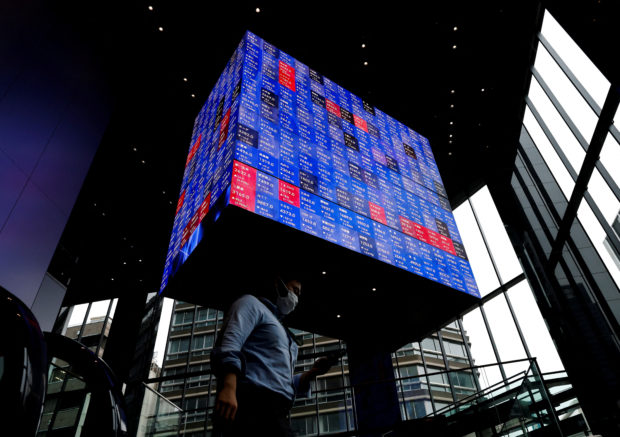
A man walks under an electronic screen showing Japan’s Nikkei share price index inside a conference hall in Tokyo, Japan June 14, 2022. REUTERS/Issei Kato/File photo
SINGAPORE – Asian shares rose to a six-month high on Wednesday while the dollar steadied, as investors waited for U.S. inflation data for cues on the Federal Reserve’s interest rate policy.
MSCI’s broadest index of Asia-Pacific shares outside Japan rose as much as 0.82 percent to touch six-month high of 538.56, while Japan’s Nikkei gained 1 percent. Australia’s S&P/ASX 200 index rose 0.90 percent.
Futures indicated the buoyant mood was set to continue in Europe, with the Eurostoxx 50 futures up 0.54 percent, German DAX futures up 0.57 percent and FTSE futures up 0.37 percent.
Fed Chair Jerome Powell, in a speech on Tuesday, refrained from commenting on rate policy but said the Fed’s independence was essential for it to battle inflation, leading U.S. stocks to end higher.
“With some expectations that Powell would likely push back on easing financial conditions, equity markets celebrated the lack of any clear guidance on policy direction,” Saxo strategists said.
Investor attention will squarely be on the U.S. consumer price index (CPI), scheduled to be released on Thursday. The data is expected to show December’s headline annual inflation at 6.5 percent, versus 7.1 percent in November.
Thursday’s data will be crucial in determining what the Fed is likely to do with interest rates in its next meeting at the start of February.
The U.S. central bank raised interest rates by 50 basis points in December after four straight 75 bps hikes in 2022 but has reiterated that it will keep rates higher for longer to tame inflation.
Investors are betting that the upcoming inflation report could show further deceleration, potentially giving the Fed room to slow the pace of interest rate rises, said Stephen Wu, economist at Commonwealth Bank of Australia.
Federal Reserve Governor Michelle Bowman said on Tuesday the central bank would have to raise interest rates further to combat high inflation and that would likely lead to softer job market conditions.
China’s stocks were 0.2 percent higher while Hong Kong’s Hang Seng index gained 1 percent, lifted by hopes of a strong economic rebound from the COVID-19 pandemic and discounted values of stocks. In the foreign exchange market, the Australian dollar was 0.3 percent higher after data showed the annual pace of inflation had increased to 7.3 percent in November. The New Zealand dollar rose 0.1 percent.
The dollar index, which measures the dollar against six major currencies, was mostly flat at 103.21, hovering close to a seven-month low.
The Japanese yen weakened 0.05 percent to 132.33 per dollar, while sterling was last trading at $1.2162, up 0.1 percent on the day.
The yield on 10-year Treasury notes was down 2.8 basis points to 3.591 percent, while the yield on the 30-year Treasury bond was down 4.3 basis points to 3.711 percent.
The two-year U.S. Treasury yield, which typically moves in step with interest rate expectations, was down 2.1 basis points at 4.237 percent.
U.S. crude fell 1.05 percent to $74.33 per barrel and Brent was at $79.32, down 0.97 percent on the day.